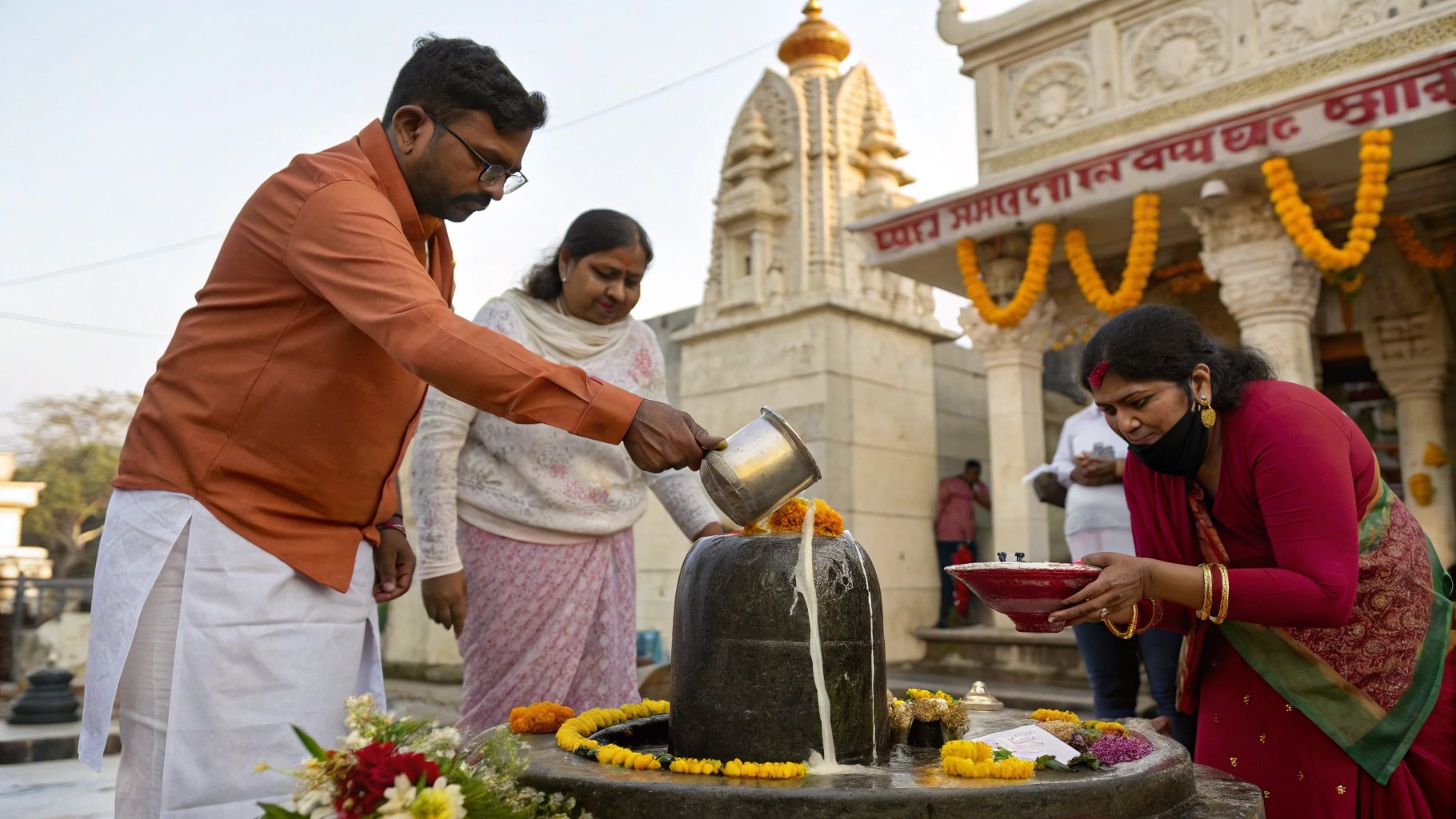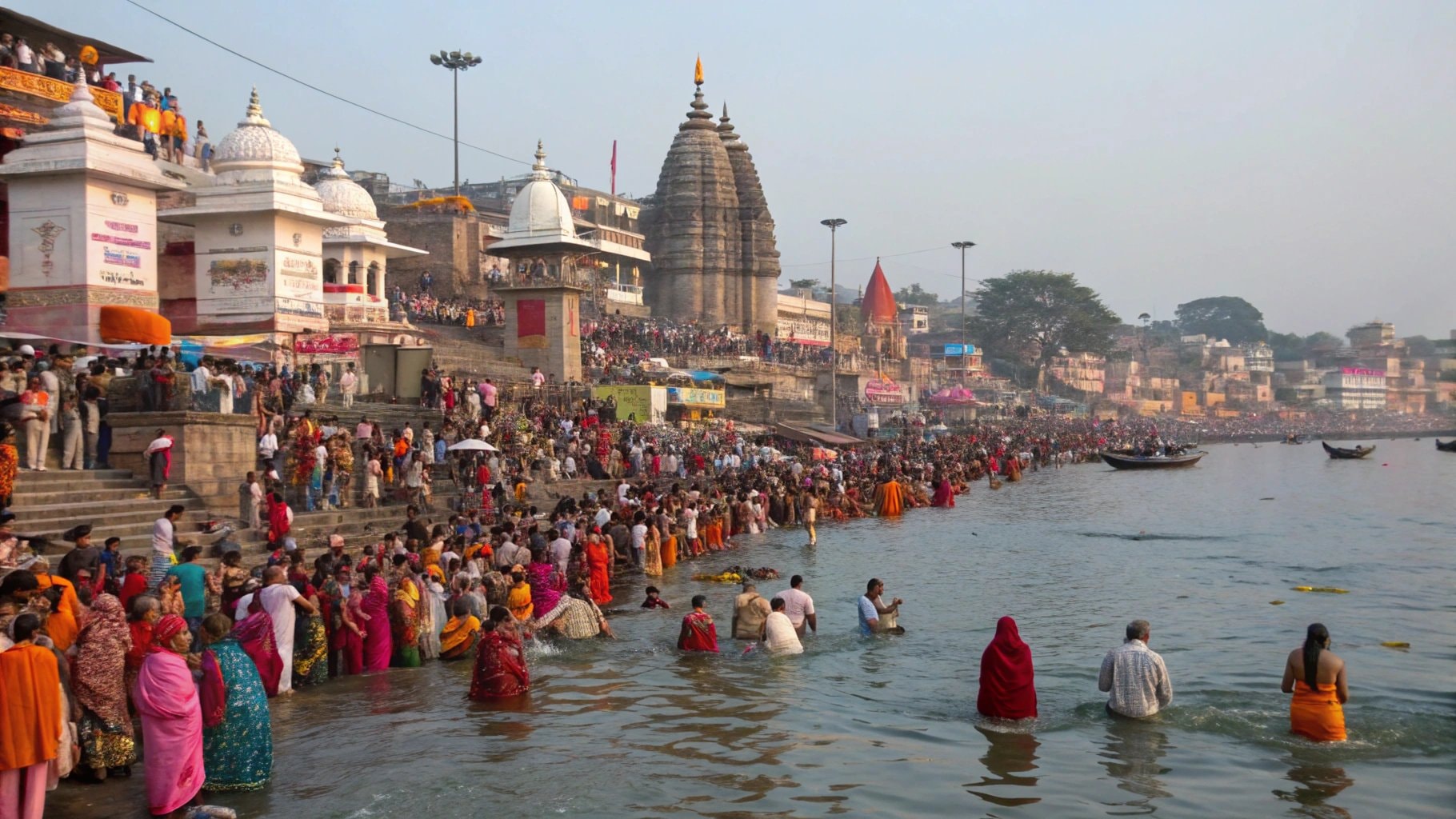- Key Takeaways
- Understanding Maha Shivratri: The Night of Divine Energy
- Maha Shivratri 2025 Date & Puja Timings
- Spiritual Significance & Mythology: Why is Maha Shivratri Celebrated?
- How to Prepare for Maha Shivratri: Sadhana & Fasting
- Maha Shivratri Puja Rituals: Worshiping Lord Shiva
- Powerful Chants & Mantras for Maha Shivratri
- Best Shiva Temples to Experience Maha Shivratri in India
- Virtual Maha Shivratri 2025 Celebrations & Online Darshan
- Conclusion
Maha Shivratri, the grand night dedicated to Lord Shiva, is one of the most significant festivals in the Hindu calendar. This auspicious festival, celebrated with fervent worship and observance, highlights the spiritual devotion and rituals performed during this important Hindu festival. In 2025, this sacred occasion falls on February 26, drawing devotees across the globe to honor the cosmic dance of creation and destruction that Shiva represents. Observed with night-long vigils, special pujas, and fasting, Maha Shivratri serves as a powerful reminder of spiritual awakening and the triumph of good over evil.
The maha shivaratri celebrations across India are marked by unique rituals and vibrant festivities at renowned temples and locations, showcasing the cultural richness and devotion of the devotees.
In this blog, you’ll learn the exact date and auspicious timings for Maha Shivratri 2025, understand the deeper importance of Lord Shiva’s role, and gain practical ways to celebrate for a truly meaningful spiritual experience.
Key Takeaways
Maha Shivratri 2025 falls on February 26 and coincides with the last day of Maha Kumbh Mela.
It marks Shiva and Parvati’s wedding and Shiva’s cosmic dance, the Tandava.
Observed by fasting, night-long prayers, and temple visits at major Shiva shrines, Maha Shivratri is recognized as one of the major festivals of Hindus.
Devotees chant powerful mantras, perform Rudrabhishek, and seek spiritual awakening.
Famous Shiva temples like Kashi Vishwanath, Mahakaleshwar, and Kedarnath attract millions of pilgrims.
Live darshan and online puja options are available for those unable to visit temples physically.
The nightlong Mahashivratri celebrations offer an immersive experience, allowing devotees to connect deeply with Shiva, either in person or through a livestream.
Understanding Maha Shivratri: The Night of Divine Energy
Maha Shivratri, or “The Great Night of Shiva,” happens each year on the 14th night of the dark fortnight in the Hindu month of Falgun (February–March). Instead of focusing on joy and abundance like many other Hindu festivals, Maha Shivratri highlights self-discipline, quiet reflection, and deep devotion.
On this sacred night, devotees hold the belief that Lord Shiva engages in the Tandava—a cosmic. It also marks the sacred union of Shiva and Parvati, symbolizing harmony and balance in nature and within ourselves. People often honor this occasion through special prayers, making simple offerings to the Shiva Linga, and chanting mantras throughout the night. Some choose to fast, stay awake until morning, or spend time in meditation. Devotional songs play a significant role in the night-long vigils, as devotees chant hymns and sing to honor Lord Shiva. These practices help us tap into a powerful energy that reminds us of our inner strength and opens the door to personal and spiritual growth by aligning with the divine energies of Lord Shiva and Goddess Shakti.
Maha Shivratri 2025 Date & Puja Timings
When you observe Maha Shivratri at the right time, the experience can feel even more powerful. This year, Maha Shivratri falls on February 26, 2025, and it’s a wonderful opportunity to honor Lord Shiva in a deeply meaningful way.
Nishita Kaal Puja (Midnight Puja): Often performed around midnight, this puja is thought to carry special blessings. Since the exact time depends on where you live, it’s best to check a local Panchang (Hindu calendar) or ask your community temple for the precise hour.
Four Prahar Puja Timings: Maha Shivratri night is split into four parts, or prahars. Each prahar holds its own energy and significance. By performing rituals and prayers during these phases, you can connect more deeply with Lord Shiva’s transformative power.
This year’s celebration is extra special because it lines up with the last day of the Maha Kumbh Mela in Prayagraj, Uttar Pradesh. If you plan to visit the Kumbh Mela or join other devotees there, you’ll find the spiritual atmosphere even more uplifting.
Spiritual Significance & Mythology: Why is Maha Shivratri Celebrated?
Maha Shivratri is closely tied to Hindu mythology and scriptures, and it carries several fascinating stories that show why this festival holds such deep meaning:
One of the key texts that highlight the significance of Maha Shivratri is the Linga Purana, which elaborates on various legends associated with the festival. This Purana emphasizes the importance of fasting and reverence to the symbolic representation of Lord Shiva, the Lingam, during this auspicious occasion.
The Wedding of Shiva and Parvati
Many believe this festival commemorates the day Lord Shiva married Goddess Parvati. If you’re seeking harmony in your relationship or hoping for marital bliss, this story can inspire you to strengthen your bond with your partner.
The Legend of Neelkanth
During the churning of the ocean (Samudra Manthan), a deadly poison called Halahala threatened all of creation. Lord Shiva bravely drank this poison, and his throat turned blue, earning him the name Neelkanth (the Blue-Throated One). It’s a powerful reminder of selfless service and compassion.
The Story of the Hunter
In another legend, a hunter unknowingly worshipped Lord Shiva by dropping Bilva leaves on a Shiva Lingam while waiting for prey. Without even realizing it, he earned salvation, which shows how sincere devotion—no matter how simple or accidental—can lead to divine grace.
Each of these myths highlights an important truth: through devotion, discipline, and sincere effort to purify your mind and heart, you open the way for deeper blessings and spiritual growth.
How to Prepare for Maha Shivratri: Sadhana & Fasting
In the days leading up to Maha Shivratri, many devotees follow Shivanga Sadhana, a spiritual practice that centers on devotion, discipline, and mindfulness. You can begin by setting aside a regular daily time for mantra chanting, meditation, or gentle yoga. This helps you focus on Lord Shiva, strengthens your resolve, and calms your mind before the festival. Some choose to visit temples or join group chanting sessions, as these collective energies can offer extra support and inspiration. Additionally, devotees often perform puja to express their gratitude and devotion through rituals and offerings.
Fasting Rules & Benefits
Fasting on Maha Shivratri is a way to purify both your body and mind, helping you direct your full attention to spiritual pursuits. There are three main ways you can observe the fast, depending on your comfort level and health condition:
Nirjala Vrat: Abstain from both food and water for 24 hours. This approach requires strong willpower and might not be suitable for everyone, so it’s wise to check with a healthcare provider if you have any concerns.
Phalahar Vrat: Rely on fruits, milk, and water throughout the day. This allows you to maintain some energy while still practicing a moderate form of fasting.
Satvik Fasting: Eat light, sattvic foods like sabudana khichdi, fresh fruits, and dry fruits. This approach is generally easier for beginners or those who need some nourishment during the day.
Breaking the Fast
Traditionally, devotees end their fast after sunrise the next day, once they have completed their final prayers or pujas. When you break your fast, start with something gentle, like warm water and fresh fruit, to help your digestive system adjust.
Additional Tips
Stay Hydrated (When Allowed): If you’re following a fast that allows liquids, sip water or warm herbal teas to keep your energy levels balanced.
Avoid Stress: Keep your schedule light. Too many errands or heavy tasks might distract you from your spiritual focus.
Mantra Chanting: Simple mantras such as “Om Namah Shivaya” can be repeated throughout the day and night to create a peaceful, introspective atmosphere.
Yoga and Meditation: Gentle yoga stretches or short meditation sessions can help calm your mind, reduce restlessness, and sharpen your focus on Lord Shiva.
Listen to Your Body: If you feel dizzy or weak, consider switching to a milder fast or having a small meal. Fasting should support your devotion, not hinder it.
By preparing well and choosing the right form of fasting, you’ll be ready to enter Maha Shivratri with a clear mind and an open heart. This day is ultimately about connecting with the divine energy of Lord Shiva, and every step you take to prepare—whether through sadhana, fasting, or quiet reflection—helps deepen that connection.
Maha Shivratri Puja Rituals: Worshiping Lord Shiva

Maha Shivratri Puja Rituals: Worshiping Lord Shiva
Maha Shivratri is traditionally observed through four phases of worship that last all night long. Each phase invites you to focus on Lord Shiva’s energy in a unique way, helping you deepen your devotion and spiritual awareness.
Early Morning Bath
Begin your day with a purifying bath or shower and wear fresh clothes. This simple act sets a clean, positive tone for the rest of your Maha Shivratri observance. Many devotees then visit a temple or create a calm, sacred space at home to start their prayers.
Shiva Lingam Abhishek
The central ritual involves offering water, milk, honey, ghee, and Bilva leaves to the Shiva Lingam. As you pour each item, keep your heart and mind focused on Lord Shiva, reflecting on his qualities of creation, preservation, and transformation. These offerings symbolize the cleansing of your own thoughts and emotions.
Chanting Shiva Mantras
Mantras like Om Namah Shivaya and the Maha Mrityunjaya Mantra are repeated throughout the night. Their vibrations are believed to bring inner peace, clarity, and protection. You can chant silently in your mind or aloud—whichever feels more natural.
Parikrama & Offerings
Walking around the Shiva Lingam (usually three or seven times) is called parikrama. During each round, you might offer flowers, fruits, or incense. This simple act represents your devotion, reminding you to stay connected to Lord Shiva’s grace in all parts of your life.
Nightlong Mahashivratri Celebrations
Many devotees choose to stay awake throughout the night during the shivaratri festival, meditating or joining group prayers and bhajans. This vigil is a way to show unwavering dedication and maintain spiritual focus, symbolizing the effort to rise above ignorance and awaken your inner light.
By following these rituals, you immerse yourself in Lord Shiva’s presence. Whether you observe the festival in a grand temple or in a quiet corner of your home, each practice helps you tune in to the divine energy that Maha Shivratri celebrates.
Powerful Chants & Mantras for Maha Shivratri
Chanting sacred Shiva mantras can strengthen your devotion, calm your mind, and connect you more deeply with the divine. During Maha Shivratri, a significant time to worship Lord Shiva, these mantras hold even greater meaning:
Om Namah Shivaya: Often called the universal mantra for Lord Shiva, “Om Namah Shivaya” translates to “I bow to Shiva.” Repeating this chant can bring peace, focus, and a gentle reminder of the divine presence that resides in everyone.
Maha Mrityunjaya Mantra: Known for its powerful healing vibrations, the Maha Mrityunjaya Mantra is believed to protect against negativity and promote health, longevity, and spiritual upliftment. Chanting it regularly, especially during Maha Shivratri, can help you feel centered and safe.
Nirvana Shatakam: Composed by Adi Shankaracharya, this Sanskrit chant serves as a profound reflection on the true nature of the Self. The verses guide you to look beyond external identities and realize the deeper spiritual essence within. It’s a beautiful way to awaken self-awareness and calm the mind.
Best Shiva Temples to Experience Maha Shivratri in India

Maha Shivratri is a festival celebrated by Shiva devotees in every corner of India, but a few places stand out for their vibrant energy and grand traditions. If you’re looking to immerse yourself in the true spirit of this festival, you might consider visiting:
Kashi Vishwanath Temple, Varanasi – One of the holiest Shiva temples in the world.
Mahakaleshwar Temple, Ujjain – Famous for its nightlong prayers and Bhasma Aarti.
Somnath Temple, Gujarat – An ancient temple with deep spiritual significance.
Isha Yoga Center, Coimbatore – Hosts a spectacular nightlong meditation and musical event.
Virtual Maha Shivratri 2025 Celebrations & Online Darshan
If you’re unable to travel or prefer to celebrate from home, there are many ways to be part of Maha Shivratri through live streams and online services. Several temples now offer live darshan, virtual puja bookings, and video broadcasts of key rituals, ensuring that distance doesn’t stop you from feeling the festival’s uplifting energy.
Live Streams from Jyotirlingas: Major Jyotirlinga temples often share their Maha Shivratri prayers and ceremonies online. You can tune in to watch the Abhishek, aarti, and other sacred rituals right as they happen.
Online Rudrabhishek Services: Some temples allow you to book a Rudrabhishek puja, one of the most important rituals dedicated to Lord Shiva, and then send you a link to watch the ceremony. It’s a thoughtful way to feel connected while staying in your own space.
Isha Foundation’s Maha Shivratri Event: The Isha Foundation hosts a grand night of spiritual activities with Sadhguru. This event is known for its blend of meditation, music, and cultural performances. You can join the celebration from anywhere in the world by streaming it on your computer or smartphone.
By taking advantage of these virtual opportunities, you can still honor Lord Shiva and feel the festive spirit from wherever you are.
Conclusion
Maha Shivratri isn’t just about performing rituals—it’s also about finding self-discipline, seeking inner peace, and forming a deeper bond with the divine. Whether you choose to fast, visit a temple, chant mantras, or join online celebrations, every step you take can lead to profound spiritual growth. As you welcome Maha Shivratri 2025, may you experience a renewed sense of clarity, harmony, and devotion. Here’s hoping this sacred night brings peace, prosperity, and enlightenment into your life.


